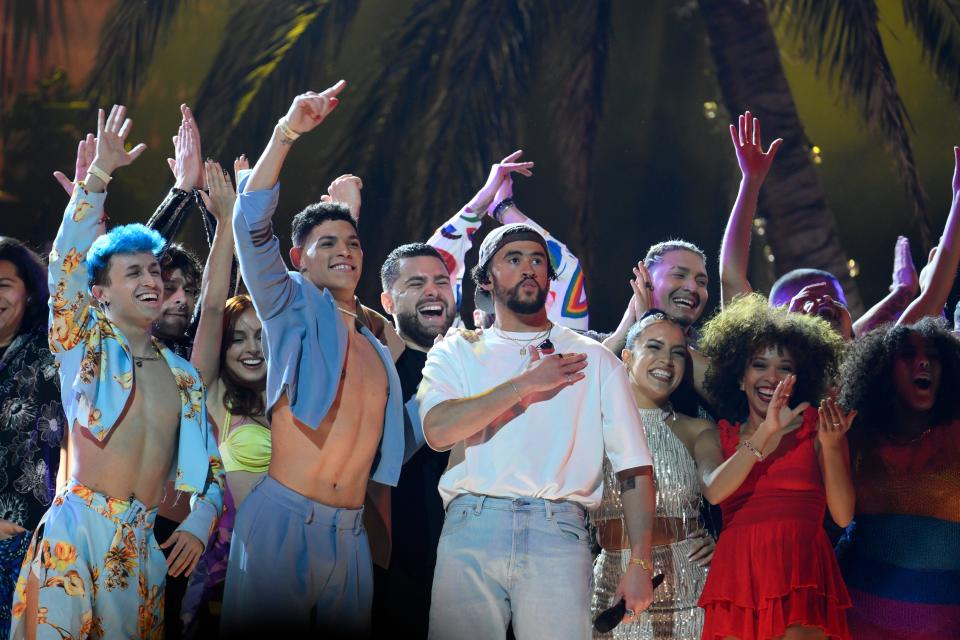How Bad Bunny's gender fluidity is shaking up a genre, empowering the Latino LGBTQ community
Bad Bunny is leading a reggaeton revolution – and a queer one at that.
The 29-year-old, whose "Un Verano Sin Ti" album was the most-streamed worldwide in 2022, has been named Spotify's most-streamed artist three years in a row, won three Grammys and continues to break his own records in a genre that's traditionally hyper-masculine.
He's also kissed a male backup dancer onstage. He dressed in drag for the "Yo Perreo Sola" music video and wore a skirt on a "Tonight Show" appearance. He straight-up told the Los Angles Times, "I don't know if in 20 years I will like a man. One never knows in life."
Many have speculated about his sexual identity, but Bad Bunny hasn't allowed himself to be labeled. After all, he's been clear that "Yo Hago Lo Que Me Da La Gana" ("I Do Whatever I Want").

He has artfully challenged homophobia in reggaeton, critiqued masculinity in the Latino community and been an ally to the LGBTQ community.
"Even though (Bad Bunny) hasn't come out and specified his sexual orientation, he has elevated the conversation on a global stage and in these pop cultural arenas where people are paying attention. Fluidity is his main message," says Dr. Nathian Rodriguez, a Journalism and Media Studies professor at San Diego State University.
As a cisgender man, however, his allyship can only go so far.
Bad Bunny's allyship and its importance
There's a misconception that Latino culture is overly macho. But it's not any more patriarchal than most other cultures.
"When we're talking about reggaeton specifically, we have to understand how, as a form of culture, it represents patriarchy, just like it represents capitalism," says Jessica Lopez Lyman, Xicana feminist scholar at the University of Minnesota. "So artists who are trying to break against these systems have to be savvy in their maneuvering, because these systems can be so dominating."
And that's part of Bad Bunny's brilliance.
In his 2019 music video for "Caro," Bad Bunny gave a "pointed critique about expectations around gender norms and gender performance," says Vanessa Díaz, an assistant professor at Loyola Marymount University, where she teaches the course "Bad Bunny and the Resistance in Puerto Rico."
Wow. Bad Bunny (@sanbenito) wore a skirt on the @FallonTonight with a sweater that read "they killed Alexa, not a man with a skirt"
Alexa was transgender woman in Puerto Rico ridiculed & killed, on her birthday, by murderers who videotaped the crime & posted it on social media. pic.twitter.com/i2iBAmdVK5— David Begnaud (@DavidBegnaud) February 28, 2020
The following year, he appeared on "The Tonight Show Starring Jimmy Fallon" to call attention to the killing of Alexa Negrón Luciano, a homeless transgender woman who was brutally killed in Puerto Rico. He wore a white T-shirt that read: "They killed Alexa, not a man in a skirt."
When fellow reggaeton star Don Omar spewed homophobic comments online, Bad Bunny tweeted: "Homophobia in this day and age? How embarrassing, man."
His words and actions have made Bad Bunny a "figure of really necessary change," Díaz adds.
GLAAD, one of the country's foremost LGBTQ advocacy organizations, honored Bad Bunny at the 34th GLAAD Media Awards this year with the Vanguard Award for his allyship.
USA TODAY has reached out to Bad Bunny's representatives for comment.
Is Bad Bunny queerbaiting?
Fans often accuse celebrities of "queerbaiting" when a straight, cisgender person seems to cash in on LGBTQ fashion, music, acting roles and more.
Queerbaiting can look like veering from gender-conforming clothing choices (remember the accusations against Harry Styles?) to prominent same-sex kisses. What makes something queerbaiting depends on how a celebrity engages overall with LGBTQ issues. These accusations can go awry, though.
"I don't like or use the term 'queerbaits,' it misses the point," says Lawrence La Fountain-Stokes, professor of culture and gender studies at the University of Michigan. "There is a long tradition in the Hispanic world of flirtatiousness that goes well beyond American obsessions with rigid categories and gender orthodoxies."

Of course, no one – celebrity or not – owes anyone an explanation about their sexuality.
"He doesn't have to say he's queer to demonstrate a queer sensibility," Díaz says.
But those with platforms are simply more scrutinized. "Just because Bad Bunny is famous, we have certain expectations of him that maybe we don't have of everyday people," Lopez Lyman adds. "And of course, there is a responsibility when you do have a public profile to a certain extent.
It's a great start, but there's a long way to go
Bad Bunny is certainly a transformative figure, but he isn't "breaking any kind of rainbow ceilings," Rodriguez says.
Still, other artists can learn from his example.
Bad Bunny has proven "you don't have to be homophobic or transphobic in order to succeed in the world of reggaeton and música urbana," says La Fountain-Stokes. Yet, he "greatly benefits from being a light-skinned, cisgender, heterosexual male performer."
But it's his authenticity, fearlessness and rejection of societal expectations that empower his fans and drive his artistic message of fluidity and community home.
"I truly don't think he cares about the value or judgment that others might put on (his choices)," Díaz says. "That's part of who he is (and) part of his artistic project."
More on Bad Bunny, Latino culture
'To me, a dress is a dress': Bad Bunny dishes on breaking gender norms through fashion
Kendall Jenner, Bad Bunny and when your maybe-kind-of-sort-of secret romance gets exposed
Kendall Jenner's tequila brand is facing cultural appropriation claims. Experts say it's complicated
'Chosen family': How ballroom instills pride in Black, Latino LGBTQ community
More: Queer Latino podcast ‘De Pueblo, Católico y Gay’ aims to fight LGBTQ stigma
This article originally appeared on USA TODAY: Bad Bunny's LGBTQ allyship, fluidity and impact on Latino fanbase

 Yahoo Movies
Yahoo Movies 
